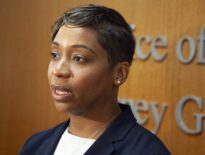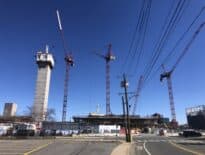How likely is a potential downturn in Boston property values to mirror a crisis that prompted legislative action in 2004? Did Mayor Michelle Wu send the wrong message by proposing to rebalance commercial and residential taxes while also advocating for an 8 percent increase in city spending? Will workers eventually return to the office more regularly, or will the changes brought on by the pandemic be permanent?
Those are just a few of the questions Boston city councilors will weigh as they continue their review of a plan Wu rolled out last month that would temporarily shift a greater share of the city’s property tax levy onto commercial owners.
Members of the panel spent more than four hours Tuesday untangling the thorny trends and policy precedent behind the measure, which the mayor and her team offered less than two months after a report sounded a dire warning about a possible tax shortfall caused by declining office values.
One councilor, Ed Flynn, made clear from the get-go that he opposes the idea. Several of his colleagues did not take as explicit an up or down stance, but voiced concerns about the long-term impact on real estate or on small businesses.
Councilor Gabriela Coletta, who chairs the Committee on Government Operations that reviewed the home rule petition, said she’s worried about the “blanket approach.”
“A ‘hammer’ is pejorative – I understand that this is well-intentioned, but I feel like it’s a hammer where we really need a scalpel to get a little bit more nuance with some of the smaller commercial folks,” Coletta said.
What Proposal Means for CRE Taxes
The home rule petition, which needs approval from the council and then the state legislature to take effect, seeks permission to tilt a bit more of the city’s property tax burden onto commercial owners instead of residential owners for a few years.
State law allows municipalities such as Boston to create separate tax rates for commercial and residential property, and to require commercial owners to pay as much as 175 percent of what the rate would have been without a split.
Wu’s proposal would allow the city to increase the maximum commercial shift to 200 percent if business property values drop significantly, then gradually shift it back down a bit each year until it returns to 175 percent in year five.
Ashley Groffenberger, the city’s chief financial officer and collector-treasurer, said that change would allow Boston to smooth out any revenue-reducing drops in commercial property values “so that it’s not all hitting at once.” She said the proposal would be temporary, not “a forever change,” and does not seek to increase the total amount of taxes the city collects.
“Absent any change to state law, a decline in commercial real estate values could put immediate pressure on homeowners and really jeopardize the affordability of homeowners for residents in Boston,” Groffenberger told the committee. “This proposal seeks to be precautionary and is both revenue-neutral, time-limited and optional, and really seeks to stabilize property taxes for all of our taxpayers, both residential and commercial.”
Fears Investment Would Be Harmed
Boston relies heavily on property taxes to fund the city budget, and city officials said businesses currently pay about 60 percent of that pot compared to 40 percent from homeowners. But if commercial real estate values plummet as some analysts expect, the amount they pay in taxes will drop, too.
A report published in February by the Boston Policy Institute and the Center for State Policy Analysis at Tufts University estimated the decline could result in a cumulative commercial property tax shortfall of $500 million per year by 2029.
Councilor John Fitzgerald said he “want[s] the mayor to have every tool in our toolbox” to prevent residents from shouldering the burden of a revenue shortfall, but said he’s concerned costs will still ultimately fall to homeowners.
“Is it trying to get blood from the stone, really, with the downtown being devalued?” Fitzgerald said. “I worry that we end up saying, ‘We’ll put the burden on the commercial properties, and they’re going to make up the delta,’ but really, we’re going to have to increase residential anyway, and both sides end up feeling the burden and you have neither side happy with you.”
“You might kill the potential of any investment in commercial property, which we desperately need as a city, and then the residents are still going to be angry anyway four years from now,” he added.
City: Trying to Avoid Resi Tax ‘Spikes’
Nicholas Ariniello, commissioner of the city’s assessing department, replied that the plan would ask commercial property-owners to take on additional burden at the start and then shift the extra load back over to residents over several years.
“The whole system is not about raising additional revenue. It’s really just about tweaking who’s responsible for what portion at what period of time,” he said. “It’s really to just try and avoid giant spikes in terms of costs being carried by any market segment.”
Wu and her deputies have likened the proposal to one former Mayor Thomas Menino pursued in 2003. The state legislature enacted a law in 2004 that enabled about 50 communities with separate commercial and residential property tax rates to shift the balance.
Ariniello told councilors that the 2003-2004 proposal “gave us a lot of comfort that commercial business was not harmed as a result of its implementation.”
“The strength of this is that we’re so closely mirroring 2003-2004,” he said. “Our hope is that it’s going to give the legislature a lot of comfort that we’re not trying to reinvent the wheel.”
Research Bureau: ‘The Message Is Selective Sacrifice’
But the comparison did not strike a chord with everyone.
Marty Walz, a former state representative and lobbyist who is interim president of the Boston Municipal Research Bureau, warned that “2024 is not 2004” because work patterns that changed in the pandemic might remain permanently altered.
Walz also contrasted the push to rebalance property taxes with Wu’s $4.6 billion fiscal year 2025 budget proposal, which would increase spending 8 percent over the current plan thanks in part to a series of new collective bargaining agreements the city inked with unions in light of the inflation that’s plumped up consumer prices over the last three years.
“I’m not here today to advocate that big budget cuts should be made, but increasing taxes at the same time there are notable increases in spending is sending a message about a lack of fiscal restraint. There is no message around shared sacrifice,” Walz told councilors. “The message from this proposal is essentially a message of selective sacrifice – certain people are going to be asked to pay more.”
Greg Vasil, CEO of the Greater Boston Real Estate Board, warned the mayor’s plan could cause “irreparable harm.”
“Boston’s leaders should be focused on making the economy more competitive, attracting businesses, and boosting foot traffic throughout the city, not increasing taxes on commercial properties,” Vasil said. “Remote work has dramatically altered the landscape for commercial property owners, and to not have their tax burden reflect the value of their buildings could do irreparable harm to an already struggling industry. We plan to continue carrying this message throughout City Hall, and if necessary, on Beacon Hill as well. Let’s work together to make Boston a work destination again.”
Budget Cuts Would Have ‘Outsized Harm’
Groffenberger suggested the tax burden shift could be a better option than trimming the other side of the ledger. She said in 2004, the city would have needed to cut about $100 million in spending to achieve the same balancing act as its tax rate changes.
“The downside or the outsize harm that we would put onto the city of cutting upwards of hundreds of millions of dollars outweighs any good you would get on the tax rate side,” she said.
Groffenberger and Ariniello said they want to be more proactive than city leaders were back in 2003, when they began the push for state action soon after it became clear that some residents were facing an immediate 40 percent increase in their tax bills.
That desire to prepare ahead of time could clash with the culture on Beacon Hill, where Democrats who control both branches often wait until deadlines are impending or have passed to complete their own time-sensitive work.
Some councilors asked Wu’s deputies about other financial strategies the city might pursue. Groffenberger said her team is exploring options, but is limited by the need to secure state approval for some changes. She pointed to a Gov. Maura Healey bill that would allow municipalities to increase or impose local taxes – which met a muted response in the legislature – as one possibility.
Councilor Julia Mejia urged the Wu administration to consider taking aim at higher education institutes with payment in lieu of taxes, or PILOT, agreements.
“I think about Harvard, I think about BU, I think about Northeastern, I think about all of these spaces and places that are occupying space and not doing their fair share in terms of their PILOT agreements,” she said. “I know [the program] is voluntary, but they are the ones who are soaking up every single piece of land that we have here in the city of Boston.”
If the council decides to advance Wu’s home rule petition, the eventual vote appears unlikely to be unanimous.
Flynn said Tuesday that he is “hesitant and opposed to any measure that would raise commercial property taxes,” suggesting that it might further hamstring the downtown office market.
“Now is not the time to increase commercial taxes or residential property taxes,” Flynn said.







